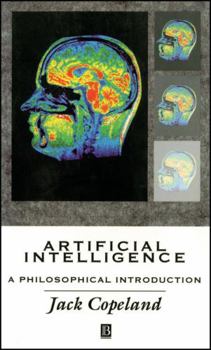Artificial Intelligence: A Philosophical Introduction
Select Format
Select Condition 
Book Overview
Presupposing no familiarity with the technical concepts of either philosophy or computing, this clear introduction reviews the progress made in AI since the inception of the field in 1956. Copeland goes on to analyze what those working in AI must achieve before they can claim to have built a thinking machine and appraises their prospects of succeeding. There are clear introductions to connectionism and to the language of thought hypothesis which weave together material from philosophy, artificial intelligence and neuroscience. John Searle's attacks on AI and cognitive science are countered and close attention is given to foundational issues, including the nature of computation, Turing Machines, the Church-Turing Thesis and the difference between classical symbol processing and parallel distributed processing. The book also explores the possibility of machines having free will and consciousness and concludes with a discussion of in what sense the human brain may be a computer.
Format:Paperback
Language:English
ISBN:063118385X
ISBN13:9780631183853
Release Date:September 1993
Publisher:Wiley-Blackwell
Length:336 Pages
Weight:1.10 lbs.
Dimensions:1.0" x 6.0" x 9.0"
Customer Reviews
1 rating
A model philosophy textbook
Published by Thriftbooks.com User , 23 years ago
This is a fascinating and lively book, which is almost incredible give that it is an introductory philosophy textbook. Copeland manages to write with both personality and balance. The combination of his style (which is clear and witty without being facetious)and the intrinsic interest of the subject of artificial intelligence had me hooked. I read it like a novel, never wanting to put it down. Copeland assumes no prior knowledge of computer science, psychology, or philosophy, so the book should be accesible to any intelligent reader, although a few parts can be hard going. Beginners are likely to struggle with the sections on the CYC project (in chapter 5) and the Church-Turing thesis (in chapter 10), but slow and careful reading should do the trick. Copeland does explain eveything you need to know in order to understand what he's saying, but some of his explanations are gentler than others. Otherwise my only complaint is that Copeland raises some interesting questions without exploring them very far. His view on the prospect for artificial intelligence is that, given the purposes for which we use such concepts as thinking, it is quite possible that there will come a day when the only reasonable course is to say that machines can think. In other words, he thinks that computers cannot now think, but that one day they (or their descendents) might become sophisticated enough that we ought to change our use of the word 'think' so that it applies to machines as well as humans. But he says very little about the purposes of concepts like thinking. In particular, he ignores the idea that rationality (surely a related concept) has great moral significance of a kind that might well make some people highly reluctant to say of any machine that it really thinks. Since this is an introductory book I don't hold this against Copeland, but it would be nice if he would say something about this in the next edition, which I believe is due out soon. I'm looking forward to it.





